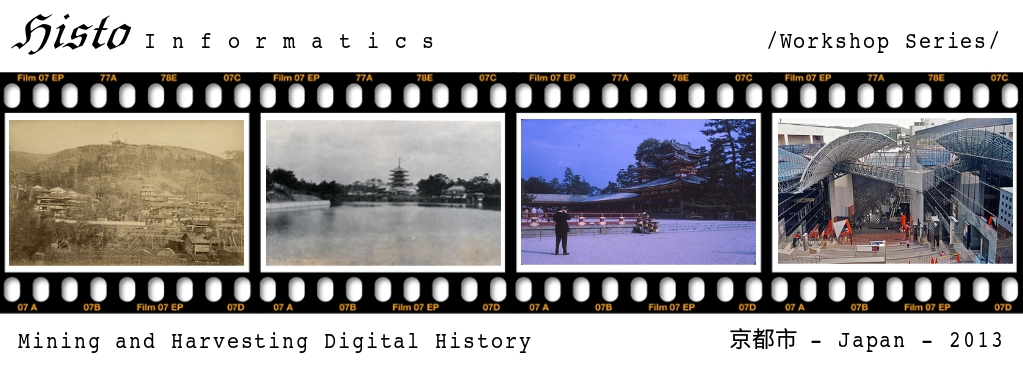
For further information see: http://www.dl.kuis.kyoto-u.ac.jp/histoinformatics2013/
Held in conjunction with 5th International Conference on Social Informatics (SocInfo 2013), 25 November 2013, Kyoto, Japan
Important dates
Paper submission deadline: October 6, 2013
Notification of acceptance: October 25, 2013
Camera ready copy deadline: November 5, 2013
Workshop date: Nov 25, 2013
The length of short papers extended to 10 pages!
The 1st International Workshop on Histoinformatics aims at fostering the interaction between Computer Science and Historical Science towards „Computational History“.
This interdisciplinary initiative is a response to the growing popularity of Digital Humanities and an increased tendency to apply computer techniques for supporting and facilitating research in Humanities. Nowadays, due to the increasing activities in digitizing and opening historical sources, the Science of History can greatly benefit from the advances of Computer and Information sciences which consist of processing, organizing and making sense of data and information. As such, new Computer Science techniques can be applied to verify and validate historical assumptions based on text reasoning, image interpretation or memory understanding.
Our objective is to provide for the two different research communities a place to meet and exchange ideas and to facilitate discussion. We hope the workshop will result in a survey of current problems and potential solutions, with particular focus on exploring opportunities for collaboration and interaction of researchers working on various subareas within Computer Science and History Sciences.
The main topics of the workshop are that of supporting historical research and analysis through the application of Computer Science theories or technologies, analyzing and making use of historical texts, recreating past course of actions, analyzing collective memories, visualizing historical data, providing efficient access to large wealth of accumulated historical knowledge and so on.
The detailed topics of expected paper submissions are (but not limited to):
- Processing and text mining of historical documents- Analysis of longitudinal document collections
- Search models in document archives and historical collections, associative search
- Causal relationship discovery based on historical resources
- Entity relationship extraction, detecting and resolving historical references in text
- Computational linguistics for old texts
- Digitizing and archiving
- Modeling evolution of entities and relationships over time
- Automatic multimedia document dating
- Applications of artificial intelligence techniques to history
- Simulating and recreating the past course of actions, social relations, motivations, figurations
- Analysis of language change over time
- Handling uncertain and fragmentary text and image data
- Finding analogical entities
- Entity linking in historical collections
- Named entity detection in historical texts
- Automatic biography generation
- Mining Wikipedia for historical data
- OCR and transcription of old texts
- Effective interfaces for searching, browsing or visualizing historical data collections
- Collective memory analysis
- Studying and modeling forgetting and remembering processes
- Vulgarization of History through new media
- Probing the limits of Histoinformatics
- Epistemologies in the Humanities and Computer Science
Full paper submissions are limited to 14 pages, while short paper submissions should be less than 10 pages (extended). Submissions should be sent in English in PDF via the submission website (see the website for link). They should be formatted according to Springer LNCS paper formatting guidelines. They must be original and have not been submitted for publication elsewhere. Submissions will be evaluated by at least three different reviewers from both computer and history science areas.
The accepted papers will be published by Springer as post proceedings volume (to appear after the workshop).
Invited Talk
Speaker: Prof. Antal van Den Bosch (Radboud University Nijmegen, The Netherlands)
Organizing Committee
-
Adam Jatowt (Kyoto University, Japan)
Gael Dias (Normandie University, France)
Agostini-Ouafi Viviana (Normandie University, France)
Christian Gudehus (University of Flensburg, Germany)
Gunter Muhlberger (University of Innsbruck, Austria)
Scientific Committee
– Robert Allen (Drexel University, USA)
-
Antal van Den Bosch (Radboud University Nijmegen, The Netherlands)
Lindsey Dodd (University of Huddersfield, UK)
Antoine Doucet (Normandie University, France)
Alexis Drogoul (Institute of Research for Development, France)
Marten During (Centre virtuel de la connaissance sur l’Europe (CVCE), Luxemburg)
Frederick Gibbs (University of New Mexico, USA)
Pedro Rangel Henriques (Minho University, Portugal))
Nattiya Kanhabua (LS3 Research Center, Germany)
Tom Kenter (University of Amsterdam, The Netherlands)
Mike Kestemont (University of Antwerp, Belgium)
Alexander Korb (University of Leicester, UK)
Andrea Nanetti (Nanyang Technological University, Singapore)
Daan Odijk (University of Amsterdam, The Netherlands)
Denis Peschanski (Pantheon-Sorbonne University, France)
Malte Rehbein (University of Passau, Germany)
Marc Spaniol (Max Planck Institute for Informatics, Germany)
Shigeo Sugimoto (University of Tsukuba, Japan)
Nina Tahmasebi (Chalmers University of Technology, Sweden)
William Turkel (University of Western Ontario, Canada)
